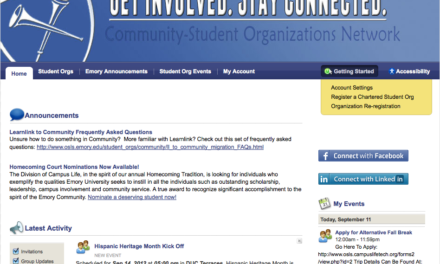Administrators are working to revise a policy that some are saying would have affected chartered organization and the Student Activities Fee (SAF).
Members of College Council (CC) recently voiced concerns about a policy which went into effect this summer and originally stated that final say over the recognition of an organization lies with the Senior Vice President and Dean for Campus Life, currently Ajay Nair. It also stated that final decisions on the distribution of the SAF rest with him or her.
Former Senior Vice President and Dean of Campus Life John Ford supervised the policy.
According to Matt Garrett, Assistant Dean for Campus Life, the policy was originally intended to clarify the rights and privileges of Emory’s organizations as well as make clear that organizations are responsible for following University policy even if they are autonomous under SGA.
Garrett said that the purpose of the policy is to “officially say that all student organizations are responsible for adhering to University policies and procedures, which kind of seems like a given, but it had never been expressly named.”
Members of College Council, though, are concerned that the policy will interfere with their duties as a body, which primarily funds organizations on campus.
Cassandra Novick, a College senior and CC Budget Chair, said that she does not see any reason for the amended policy, given that students are already liable to the University via the conduct and honor codes.
“There is absolutely no room or argument for administrator involvement [in the SAF],” she said.
With regards to the SAF, usually SGA has sole authority over how SAF is spent. The amended policy, however, gives the administration joint control and jurisdiction over SAF.
Students contribute all of the money to the SAF, and so some CC members believe that the students should facilitate and distributed it and no one else.
“We have to take this extremely seriously,” said Reuben Lack, College freshman and CC representative. “If the end policy gives the administration the ability to change any of our decisions about money or chartering, it negates our entire purpose.”
Ashish Gandhi, College senior and SGA President, disagrees. He said he does not believe that the policy will interfere with SGA or CC decisions.
“There was no mal-intention with the original policy – it was just bad wording,” said Gandhi. “Dean Nair and Matt Garrett respect what the students think.”
Similarly, Amitav Chakraborty, College senior and CC President, trusts Nair.
“I think the final authority should rest with the students,” said Chakraborty. “I think the revision will be one that reflects our opinion…Dean Nair is a very cool head.”
Novick also believes that the administration felt the need to institute this policy as a result of the controversy surrounding Students and Workers in Solidarity (SWS), a club whose members were arrested in Spring 2011 for protesting the mistreatment of Sodexo workers on the quad.
In an email sent to members of the administration and SGA, Garrett wrote that “we were dealing with groups on campus trying to act as though they had some authority to use Emory space, operate on campus with Emory’s name, etc. when in fact they were not recognized by SGA or any other University office/department.”
In follow-up interviews, both Nair and Garrett have denied the policy’s connection to SWS.
“That’s certainly not an example I would tie to this policy…they’re not even a registered student organization,” said Garrett. “We’re not gonna intervene if a student organization breaks SGA policy, but if a student organization is hazing, that’s a University issue,” he continued, explaining the delineation between being liable to SGA versus to Emory.
Since concerns were raised about the policy, Garrett and Nair have taken steps to revise the rhetoric of the policy.
Originally, the policy stated that final say over the SAF resided exclusively with the administration. Now, the policy reads that final decisions are to be made by SGA “in consultation” with the administration.
Both Garrett and Nair were adamant that the spirit of the policy was never to take authority away from SGA.
“There are subtle things that make it explicitly clear that student self governance is a strong value at Emory…but that it is a partnership with campus life, and the campus life would enter the conversation to support SGA in upholding particular rules and regulations,” said Nair, who came to Emory after the policy went into affect.
Nair also clarified that the Board of Trustees will not be involved in this policy because they only have jurisdiction over “its fiduciary responsibility” and “academic organization of the university.” This policy is an issue of campus life, which “falls to the administration and faculty…I’m committed to working collaboratively with students to review Campus Life policies.”
– By Rupsha Basu
The Emory Wheel was founded in 1919 and is currently the only independent, student-run newspaper of Emory University. The Wheel publishes weekly on Wednesdays during the academic year, except during University holidays and scheduled publication intermissions.
The Wheel is financially and editorially independent from the University. All of its content is generated by the Wheel’s more than 100 student staff members and contributing writers, and its printing costs are covered by profits from self-generated advertising sales.





